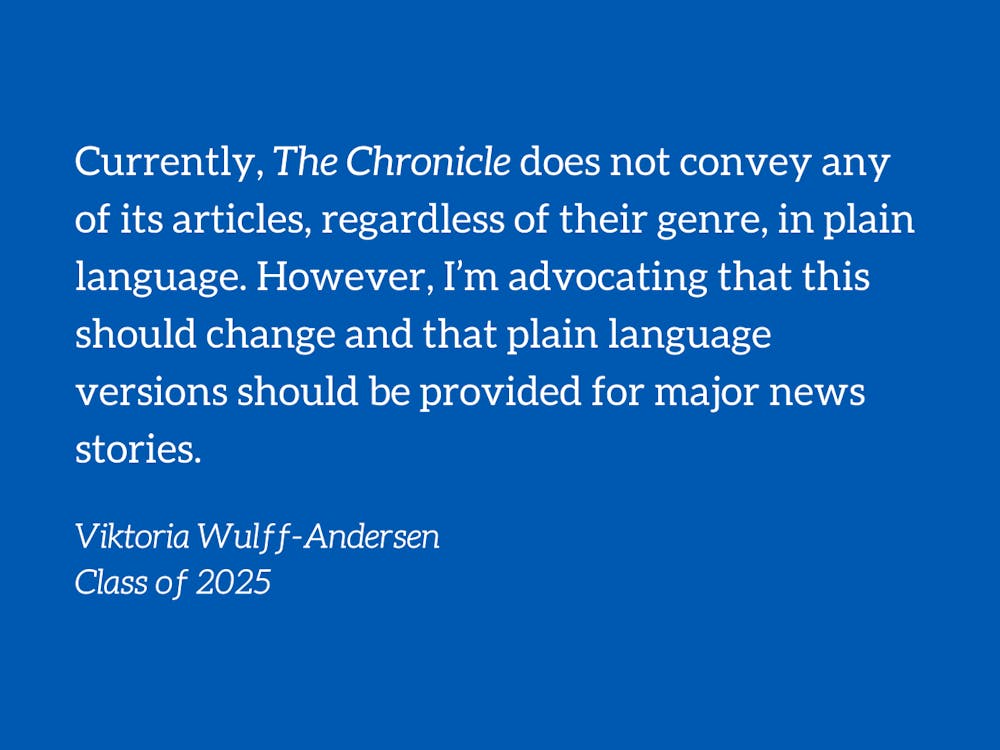Most of my articles for The Chronicle are filled with flowery language and complex sentences. They match the style of other stories on the site. Rather than express our messages in simple terms, we Chronicle writers often express ourselves in complicated ways.
This can provide barriers to people who have English and literary deficiencies: people with disabilities, English language learners and others. One way to help break down these barriers is through the use of plain language.
By now, you may have noticed that my writing style in this article is noticeably different from my writing style in previous articles. I am presently writing in plain language. Plain language is defined by the Plain Writing Act of 2010 as “writing that is clear, concise, well-organized, and follows other best practices appropriate to the subject or field and intended audience.” Essentially, plain language makes communication easier to understand for a wider population.
Plain language articles are written in mostly simple sentences. They may include pictures or lists as alternatives to long paragraphs. They are concise and remove redundant words. Each phrase has a purpose and conveys the main message clearly. Most importantly, plain language is designed for quick and more accessible reading.
Ever since plain language became popularized in 21st century America by the adoption of the Plain Writing Act that made government documents accessible through plain language, the writing style has become increasingly used by publications. The Times in Plain English has been running easy-to-read versions of The New York Times articles since 1996. Buzzfeed’s investigation articles on conservatorships include plain language copies, especially to help those in conservatorships themselves.
Currently, The Chronicle does not convey any of its articles, regardless of their genre, in plain language. However, I’m advocating that this should change and that plain language versions should be provided for major news stories.
You may wonder why The Chronicle should include copies of articles in simple English if it services an elite institution. While this is a valid thought, it is also one that is rooted in ableist bias. Plain language does not oppose academic standards. Accessibility should be found everywhere, even on prestigious college campuses.
Furthermore, The Chronicle doesn’t just service students, some of whom have differing abilities to the general student body. The Chronicle services “Duke alumni, parents and sports fans who want the latest news from Durham.” All of these diverse groups produce a monthly readership of 350,000. This amount means that The Chronicle has readers of unique educational backgrounds and reading capabilities.
Present news stories from The Chronicle may not be accessible to all of its readers. Having easier-to-understand articles will allow for more people to receive and comprehend news about Durham and Duke, allowing for important messages to reach a wider audience. Able-bodied students, faculty members and other readers will also benefit from plain language article copies if they need to get their news in a rush.
I’m not saying that all news stories should have a plain language version, starting now. Nor am I shaming The Chronicle for not considering this option before. I’m not saying that all articles should only be written in plain language from now on (I’m going to continue writing my pieces with formal language) as that would take away from the value in The Chronicle’s style diversity. Nor am I saying that a plain language column has to be implemented.
I simply want to suggest that major news stories such as those on COVID-19 or campus policy updates, alongside stories centered on disability rights and access, have linked plain version copies. Whether The Chronicle does this by selecting a student to translate what they believe to be important stories and posting that plain language copy to the original article, or whether the Chronicle finds another way, implementing this change would improve the future of The Chronicle and its audience. I’ll even volunteer my time to make this happen.
Viktoria Wulff-Andersen is a Trinity first-year. Her column usually runs on alternate Mondays.
Get The Chronicle straight to your inbox
Signup for our weekly newsletter. Cancel at any time.
Viktoria Wulff-Andersen is a Trinity junior and the opinion editor of The Chronicle's 119th volume.

